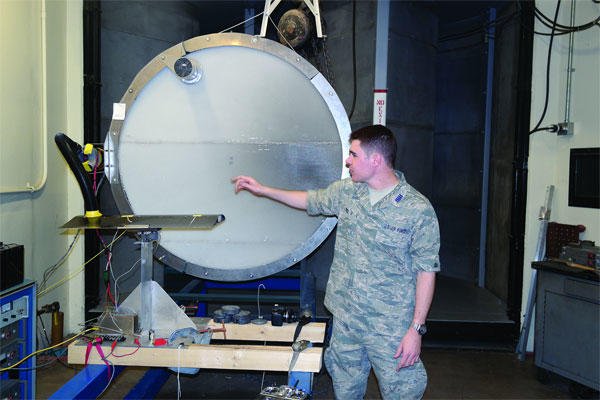U.S. AIR FORCE ACADEMY, Colo. -- An Air Force Academy team bested the two other service academies in the first competition to design the most innovative project to address warfighter challenges.
Sponsored by the Defense Advanced Research Projects Agency, the research-driven competition featured three teams from USAFA, the U.S. Military Academy and the U.S. Naval Academy.
Lt. Col. A.J. Rolling, assistant professor of aeronautics, and his cadet team won for their distributed propulsion engine, a way of using "bleed" air to increase fuel efficiency. In the lab, Rolling's patent-pending invention saves at least 50 percent of fuel costs. Cadets 1st Class Giovanni Allevato, Jane Kaufmann, Stefan Morell, Luke Rockwell and David Simeroth were the winning presenters.
The semester-long competition started with 10 Academy teams, with projects ranging from developing unmanned aerial systems to serve as wingmen for the F-22 Raptors, to miniaturized swarms of unmanned aerial vehicle systems that perform reconnaissance and intelligence missions.
A local competition narrowed the teams to three who went to Washington this week to compete in the DARPA challenge. The teams were from the Aeronautics and Mechanical Engineering Departments.
Academy cadets also presented research on a patent-pending "global strike" engine combining long endurance and supersonic dash by combining elements of a propeller engine with those of a jet engine. The third team presented research covering advance intelligence and reconnaissance networks.
DARPA's calling the contest a pilot project, and awarded USAFA more than $200,000 for the teams to compete, said Dr. James Solti, the Academy's deputy director of research.
"After this year, they'll evaluate if they want to continue, expand it with more money, or end it," he said. "DARPA is in the business of finding solutions to the warfighter's most challenging problems. And they're hoping this contest will identify robust solutions to improve our nation's future warfighting capability."
DARPA listed only two requirements for the competition: impact to the warfighter and innovation.
"Innovation and Impact to the Warfighter are the only judging criteria," Solti said. "There are problems warfighters find vexing; the competition is to propose solutions. There doesn't have to be a product, necessarily, just a potential solution for answering a real-world need."
DARPA is looking to the future, he said, and hoping the service academies can help navigate the challenges that might arise.
Rolling's invention fit DARPA's requirements.
"The distributor ejector engine has the most promise," he said. "It saves at least 50 percent of fuel costs. What aircraft engine company isn't interested in that?"
The engine works by redirecting excess air through the wing, creating more forward-thrust with less fuel. The engine has the additional benefit of being quieter than traditional plane engines.
Rolling said traditional aircraft engineers could be interested in installing the fuel-efficient engine, but it can also increase the flying time for the military drones, currently constrained by fuel and battery life.
Rolling has already briefed aircraft engine maker Pratt & Whitney about his invention.
"They said it was a paradigm shift in engine design," he said. "It changes the entire design system. But it is also practical -- it works."
Cadets say the experience has taught them important lessons to remember as they begin their Air Force careers as second lieutenants.
We had to work together to get it done," said Cadet 1st Class Tyson Rydalch, an aeronautics major who went to DARPA this week. "There were a lot of issues we had to pay attention to -- if we didn't do it right, we had to start over again."
The experience gave cadets a greater appreciation for the senior technicians at the Academy.
"We are working with senior technicians with 20 years' experience," Rydalch said. "And we learned a lot from them about how to do things right -- if we messed up one little thing, the rest of the system didn't work. We got a lot of guidance."
While the DARPA competition win won't bring a cash award, Solti said winning is about more than just bragging rights.
"It's about coming up with real solutions to real problems," he said. "The winning project does just that. It's a significant opportunity to showcase that USAFA is truly the Air Force's Academy."



























